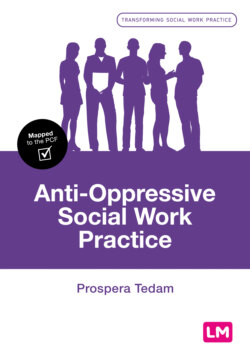Читать книгу Anti-Oppressive Social Work Practice - Prospera Tedam - Страница 74
На сайте Литреса книга снята с продажи.
Mental health
ОглавлениеThe age-old discourse around ‘care’ versus ‘control’ in mental health practice is one that centres around power, and the use of power by social workers and other mental health practitioners. Tew (2006) suggests that issues of power are intrinsically linked to mental ill health, from eating disorders where people feel a sense of power to control what they eat, to the area of recovery where people are left thinking about how they might reclaim spaces from which they may have previously been excluded – for example, at work, within the family or in a relationship. Writing about the use of power by nurses in the mental health field, Cutcliffe and Happell (2009) identify several areas where power is used over service users. These areas include the removal of personal freedom, forced administration of medication, deciding what will and will not be discussed, use of language, and deciding what might be in the client’s best interest and what course of action should be taken. In social work, it is well known that service users from Black minority ethnic groups are overrepresented in mental health services in the UK (Jupp, 2005; Memon et al., 2016) and in the USA, African American men suffering from schizophrenia and bipolar disorder are more likely to be in prison than White men (Holden et al., 2012).
The area of mental health is one that illuminates issues of power in the practice and delivery of social work services. Anti-oppressive practice in mental health social work would require practitioners to develop and enhance their skills in reflection in order that they are better able to recognise and understand the sometimes invisible manifestations of power (Cutcliffe and Happell, 2009, p116) inherent in their practice. Consideration of anti-oppressive practice at the personal, cultural and societal levels will be critical.
Research by Memon et al. (2016) found that Black and minority ethnic service users felt that they were often being talked down to (p5) and did not have the power to make decisions about matters that were affecting them. One service user remarked: ‘We have to follow what the professional said; if we do not want to follow what they are saying, it is our problem.’ This feeling of helplessness was exacerbated when, as a consequence of being assertive, one service user was taken off the list and denied further services (p5).
Building trust and maintaining healthy, respectful relationships with mental health service users is a crucial first step towards enhancing anti-oppressive practice in the field of mental health. It is also important that social workers in this area understand what gives rise to inequitable service provision to specific minority groups, as well as identifying what steps they can take to enhance anti-oppressive practice.
Stigma is another area where professional social work intervention can support and advocate on anti-oppressive practice through anti-stigma work. A study by Arboleda-Flórez and Stuart (2012) found that stigmatisation is degrading and devalues people with mental ill health. Social workers need to be aware of how their own behaviours and attitudes could reproduce stigma within families and communities and should introduce robust anti-stigma practice that will not only be beneficial to service users, but will also enhance the image of the social work profession.
